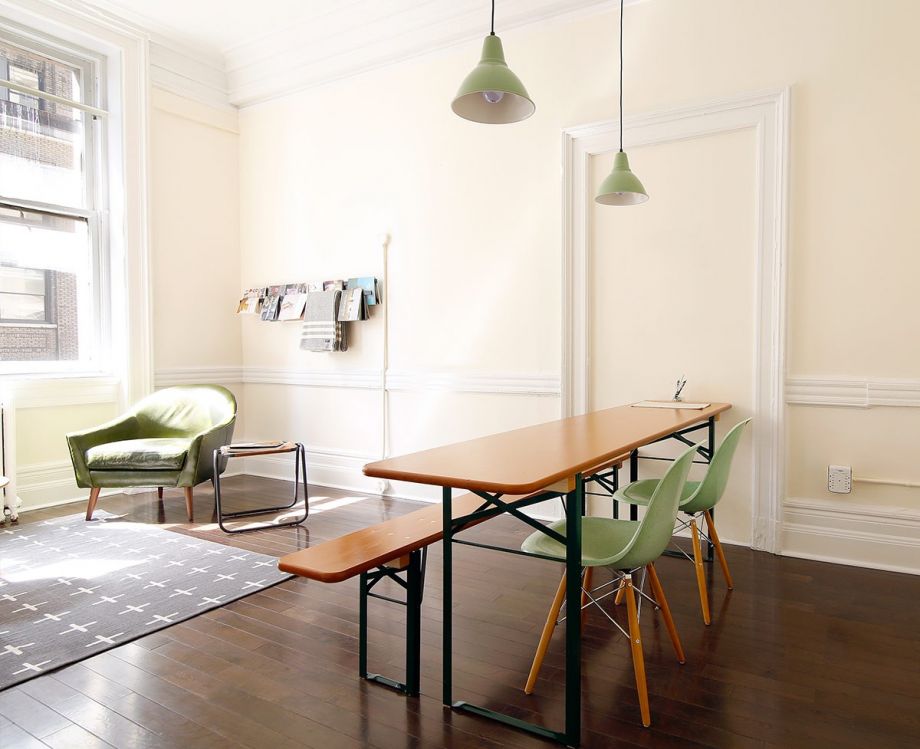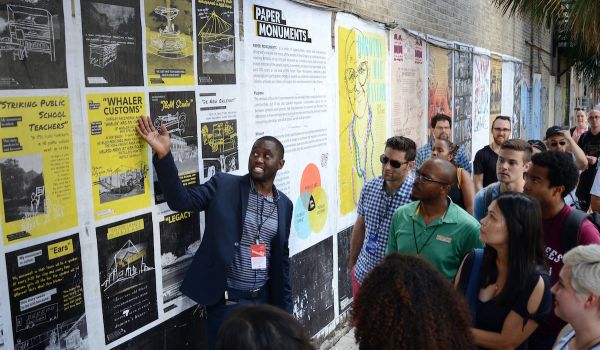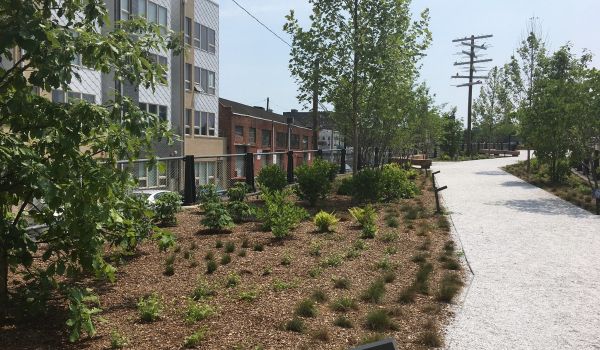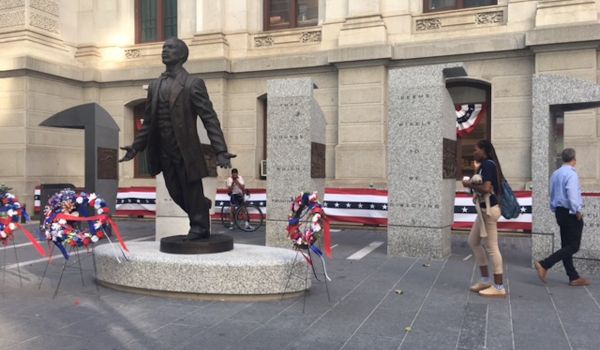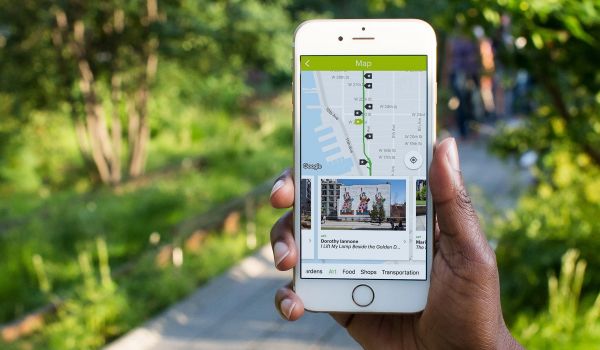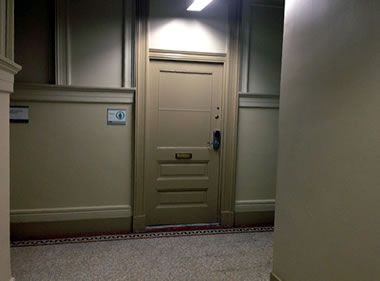
There aren’t many Breathers. With only about a dozen between the company’s home city of Montreal and New York City, “one percent” is Breather.com co-founder Julien Smith’s response when I ask him how far the company is on its journey. But Breather intrigues. For one thing, by opening up in commercial buildings Breather routes around many of the legal and political battles that room-sharing platforms like Airbnb are facing. For another, it unlocks tiny city spaces that would otherwise be off-limits. That’s a fair amount of access, excitement, and respite to be had for what it would cost me to take a cab ride back to Brooklyn.
I’d known my Breather easily by the green tree logo prominently placed by its door, but let’s back up. When I’d arrived at the Townsend Building, I knew from the instructions on the Breather app to show the doorman ID and ask for Room 809. (For research purposes I had selected a space in a guarded building; most Breather spaces in New York City — in Soho, the Garment District, and near Penn Station — aren’t.) “Oh, you’re going up there to get some fresh air?,” the guard said pleasantly. Yes, I said, and not knowing if this was some sort of code, I pressed: “Do a lot of people go up there for fresh air?” No, he said quickly. It was a little weird, but while I’d anticipated there might be friction, it was about as smooth a transaction as just about any with a security desk in any New York City building.
And so I’d headed upstairs in the 100-year-old building, past the office doors of small architectural firms, design shops, and therapists. Mashing a giant button on the Breather app to check in, I was presented with a temporary six-digit code. I punched it into a keypad by the door. It unlocked. Inside, the aesthetic suggests I’m visiting the post-college apartment of an artistic friend who has taken her first decent-paying office job. The ceilings are high. The floors are hardwood. There’s plenty of light. It’s clean but not antiseptic. And while the furniture isn’t plentiful, there are a few nice pieces: a $1,100 minimalist gray couch from BluDot, for example. A makeshift desk seats two, and from a comfy green leather chair, I have a view of Madison Square Park. More a nod to ambience than utility, the horizontal reading rack on the wall holds Lucky Peach, chef David Chang’s collaboration with the McSweeney’s publishing empire; the tech-and-culture title Offscreen; and a copy of Susan Cain’s “Quiet.” There’s free coconut-water lemonade, free Tootsie Rolls, and free WiFi. The password: “peaceandquiet.”
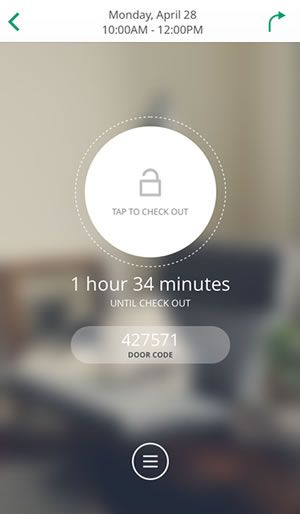
Breather launched in Canada in November and in New York only two months ago, and the service will expand to San Francisco next month. Smith predicts 50 Breather spaces in cities all over by the end of 2014. Monthly memberships are a possibility, as is inviting landlords to list their own Breather spaces. And while they raised about $1.5 million this summer, they’re still in the stage right now of figuring out how exactly Breathers should work.
But one thing that they’ve already cracked, says Smith, is how to avoid the regulatory gauntlet that networked home-renting services are running, especially in New York. That’s by design. When I ask Smith about Airbnb’s woes, he says, “you can actually write at this point, ‘He laughs maniacally.’” Setting up Breathers in commercial buildings circumvents restrictions on the use of residential spaces. “What we do it totally legal,” says Smith. Beyond that, the nature of commercial buildings — fewer people probably flow in and out of a Breather in a day than, say, your average psychotherapist’s office — cuts down on some of the conflict among neighbors that can plague an Airbnb. “You don’t feel weird, they don’t feel weird,” says Smith. In many buildings, “I think they barely know we exist.”
Smith co-founded Breather with longtime friend Caterina Rizzi. She had a track record of opening retail spaces and he, as an oft-traveling author of business books, was constantly on the lookout for short-term spaces to set up shop for a morning, for an afternoon, for a few hours between meetings. Breather is part of what may well be a trend of using technology to tap small unused bits of space, one that also includes Parkatmyhouse.com for letting out empty driveways and the like and YouCamp.com, an Australian platform for finding spots on private property to pitch a tent. Breather, too, is piggybacking off an increase in professional free agency where more and more people are likely to find themselves, at one point or another, in a city with no place to call home.
At the moment, Montreal Breathers run 10 dollars less than the New York City spaces, price points that Smith says are hardly written in stone. Still, on the company’s end, “the math works,” he says. “That’s the part that’s really crazy. We make really decent money and we make it all day.” Whether Breather holds the lease to what one investor calls “dormant real estate” or another landlord does, says Smith, “I’m buying it wholesale and selling it retail.” That’s even when you factor in the cleaning crews that, as I saw, come by after every use. And the costs of that, he says, will drop as Breathers grow more clustered in a city.
On the customer’s end, whether the math works is in the eye of the beholder. “What am I willing to pay for a really productive afternoon?,” floats Smith. Factor in the cost of the unavoidable Starbucks coffee and time lost fiddling with the Internet connection, consider the fact that you can share a Breather with others — occupancy numbers are listed on the app — and $15 or $25 an hour may well start to look like a good deal.
Of course, hourly rentals tend to be associated with activities more unseemly than the email-checking, note-taking, and Madison Square Park-gazing I did in my Breather. Get your mind out of the gutter, Smith says, because people use Breathers to hold business meetings, read lines, practice the violin, charge a cellphone. (There are plenty of outlets and an iPhone charger). Times have changed. “The reality is,” he says, “when you add technology to the mix, ‘hourly’ becomes a very versatile thing.” For one thing, says Smith, it means that with just an app and a network connection, “you can unlock a door.” For an hour or two, at least. After that, it becomes someone else’s Breather.

Nancy Scola is a Washington, DC-based journalist whose work tends to focus on the intersections of technology, politics, and public policy. Shortly after returning from Havana she started as a tech reporter at POLITICO.

